Importance of Reducing Single Use Plastic for Corporate Social Responsibility
VerifiedAdded on 2023/06/12
|15
|5280
|136
AI Summary
This report discusses the importance of reducing single use plastic for corporate social responsibility and how it impacts the environment, animals, customers, and the reputation of the company. It includes different ethical theories, models, and CSR trends that affect management decisions in relation to single use plastic products and how organizations can effectively implement sustainable practices.
Contribute Materials
Your contribution can guide someone’s learning journey. Share your
documents today.
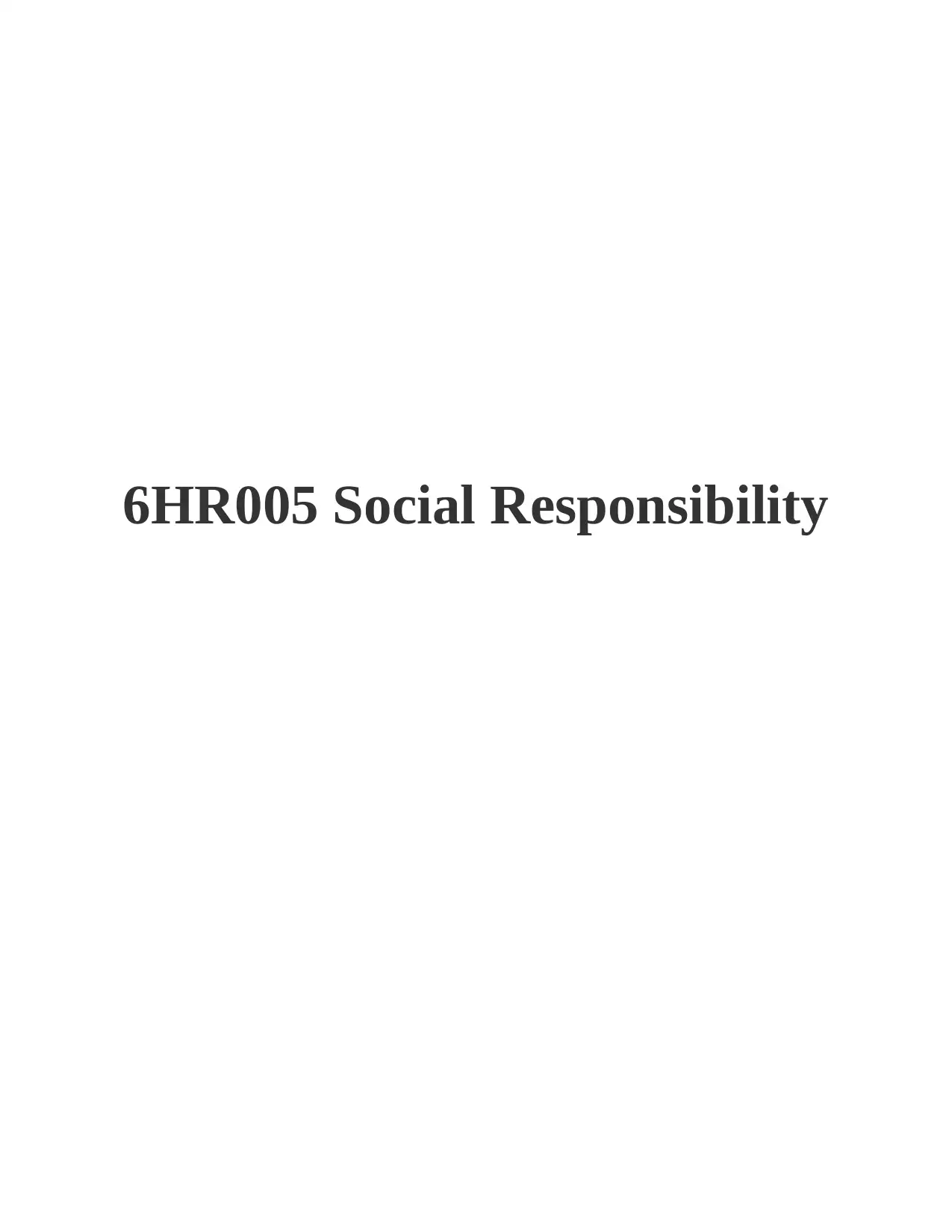
6HR005 Social Responsibility
Secure Best Marks with AI Grader
Need help grading? Try our AI Grader for instant feedback on your assignments.
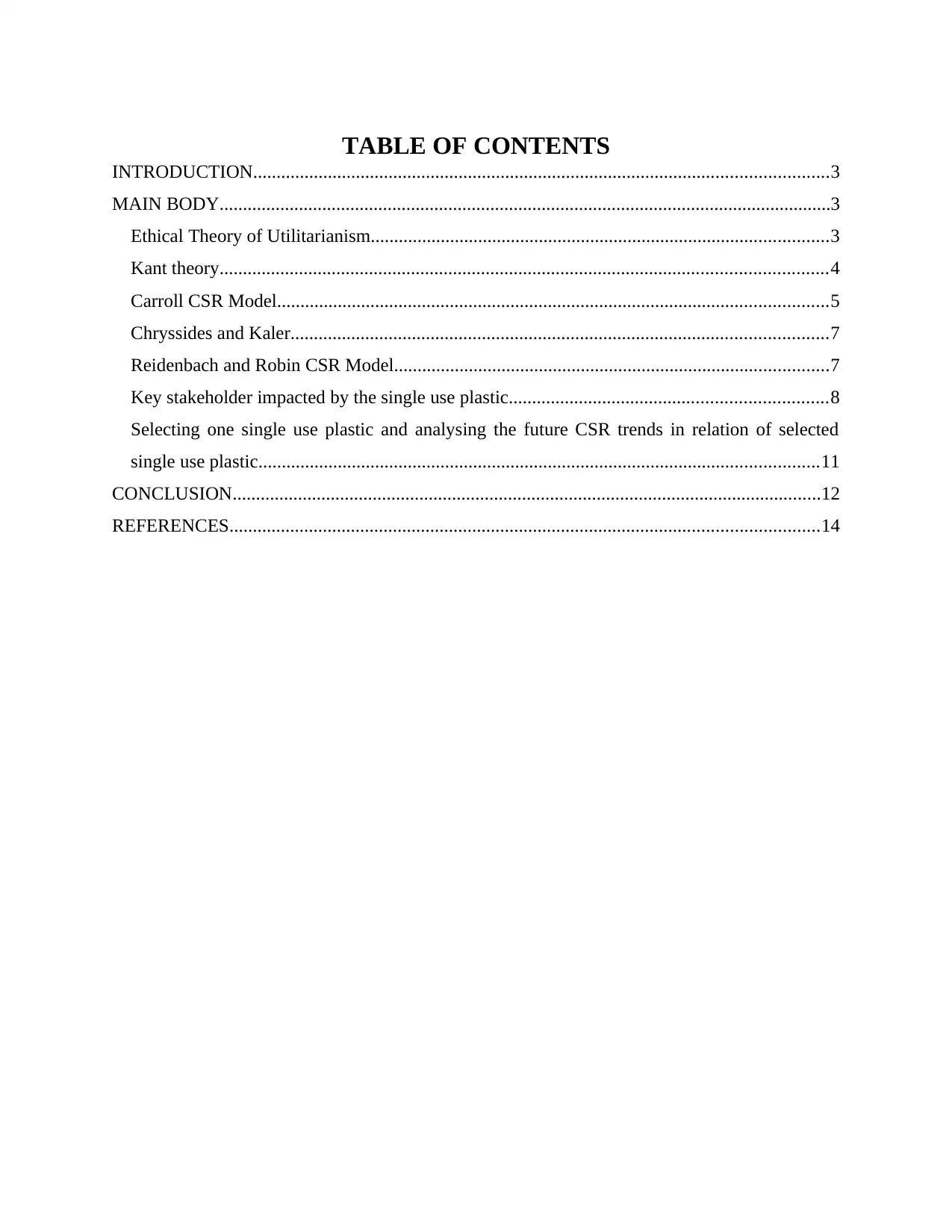
TABLE OF CONTENTS
INTRODUCTION...........................................................................................................................3
MAIN BODY...................................................................................................................................3
Ethical Theory of Utilitarianism..................................................................................................3
Kant theory..................................................................................................................................4
Carroll CSR Model......................................................................................................................5
Chryssides and Kaler...................................................................................................................7
Reidenbach and Robin CSR Model.............................................................................................7
Key stakeholder impacted by the single use plastic....................................................................8
Selecting one single use plastic and analysing the future CSR trends in relation of selected
single use plastic........................................................................................................................11
CONCLUSION..............................................................................................................................12
REFERENCES..............................................................................................................................14
INTRODUCTION...........................................................................................................................3
MAIN BODY...................................................................................................................................3
Ethical Theory of Utilitarianism..................................................................................................3
Kant theory..................................................................................................................................4
Carroll CSR Model......................................................................................................................5
Chryssides and Kaler...................................................................................................................7
Reidenbach and Robin CSR Model.............................................................................................7
Key stakeholder impacted by the single use plastic....................................................................8
Selecting one single use plastic and analysing the future CSR trends in relation of selected
single use plastic........................................................................................................................11
CONCLUSION..............................................................................................................................12
REFERENCES..............................................................................................................................14
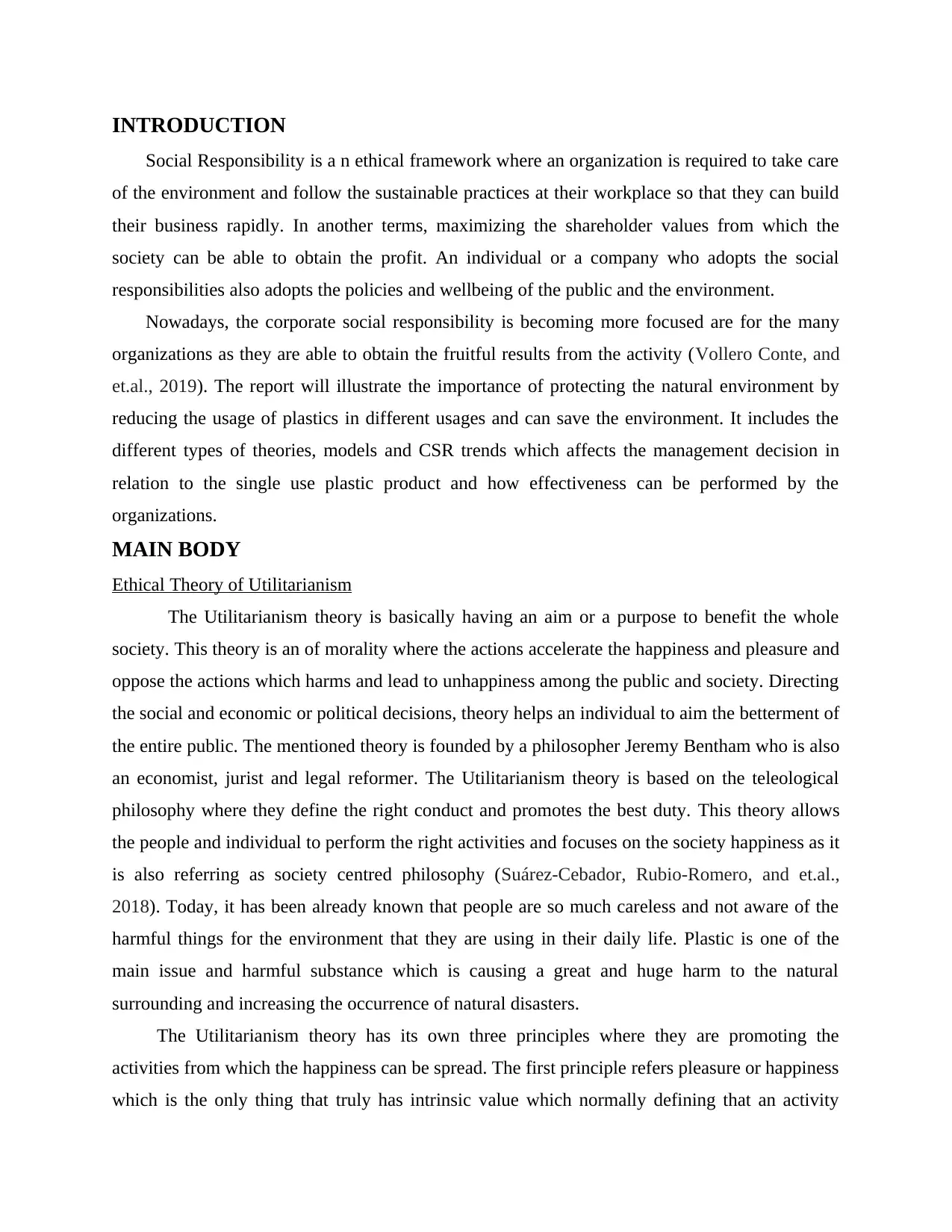
INTRODUCTION
Social Responsibility is a n ethical framework where an organization is required to take care
of the environment and follow the sustainable practices at their workplace so that they can build
their business rapidly. In another terms, maximizing the shareholder values from which the
society can be able to obtain the profit. An individual or a company who adopts the social
responsibilities also adopts the policies and wellbeing of the public and the environment.
Nowadays, the corporate social responsibility is becoming more focused are for the many
organizations as they are able to obtain the fruitful results from the activity (Vollero Conte, and
et.al., 2019). The report will illustrate the importance of protecting the natural environment by
reducing the usage of plastics in different usages and can save the environment. It includes the
different types of theories, models and CSR trends which affects the management decision in
relation to the single use plastic product and how effectiveness can be performed by the
organizations.
MAIN BODY
Ethical Theory of Utilitarianism
The Utilitarianism theory is basically having an aim or a purpose to benefit the whole
society. This theory is an of morality where the actions accelerate the happiness and pleasure and
oppose the actions which harms and lead to unhappiness among the public and society. Directing
the social and economic or political decisions, theory helps an individual to aim the betterment of
the entire public. The mentioned theory is founded by a philosopher Jeremy Bentham who is also
an economist, jurist and legal reformer. The Utilitarianism theory is based on the teleological
philosophy where they define the right conduct and promotes the best duty. This theory allows
the people and individual to perform the right activities and focuses on the society happiness as it
is also referring as society centred philosophy (Suárez‐Cebador, Rubio‐Romero, and et.al.,
2018). Today, it has been already known that people are so much careless and not aware of the
harmful things for the environment that they are using in their daily life. Plastic is one of the
main issue and harmful substance which is causing a great and huge harm to the natural
surrounding and increasing the occurrence of natural disasters.
The Utilitarianism theory has its own three principles where they are promoting the
activities from which the happiness can be spread. The first principle refers pleasure or happiness
which is the only thing that truly has intrinsic value which normally defining that an activity
Social Responsibility is a n ethical framework where an organization is required to take care
of the environment and follow the sustainable practices at their workplace so that they can build
their business rapidly. In another terms, maximizing the shareholder values from which the
society can be able to obtain the profit. An individual or a company who adopts the social
responsibilities also adopts the policies and wellbeing of the public and the environment.
Nowadays, the corporate social responsibility is becoming more focused are for the many
organizations as they are able to obtain the fruitful results from the activity (Vollero Conte, and
et.al., 2019). The report will illustrate the importance of protecting the natural environment by
reducing the usage of plastics in different usages and can save the environment. It includes the
different types of theories, models and CSR trends which affects the management decision in
relation to the single use plastic product and how effectiveness can be performed by the
organizations.
MAIN BODY
Ethical Theory of Utilitarianism
The Utilitarianism theory is basically having an aim or a purpose to benefit the whole
society. This theory is an of morality where the actions accelerate the happiness and pleasure and
oppose the actions which harms and lead to unhappiness among the public and society. Directing
the social and economic or political decisions, theory helps an individual to aim the betterment of
the entire public. The mentioned theory is founded by a philosopher Jeremy Bentham who is also
an economist, jurist and legal reformer. The Utilitarianism theory is based on the teleological
philosophy where they define the right conduct and promotes the best duty. This theory allows
the people and individual to perform the right activities and focuses on the society happiness as it
is also referring as society centred philosophy (Suárez‐Cebador, Rubio‐Romero, and et.al.,
2018). Today, it has been already known that people are so much careless and not aware of the
harmful things for the environment that they are using in their daily life. Plastic is one of the
main issue and harmful substance which is causing a great and huge harm to the natural
surrounding and increasing the occurrence of natural disasters.
The Utilitarianism theory has its own three principles where they are promoting the
activities from which the happiness can be spread. The first principle refers pleasure or happiness
which is the only thing that truly has intrinsic value which normally defining that an activity
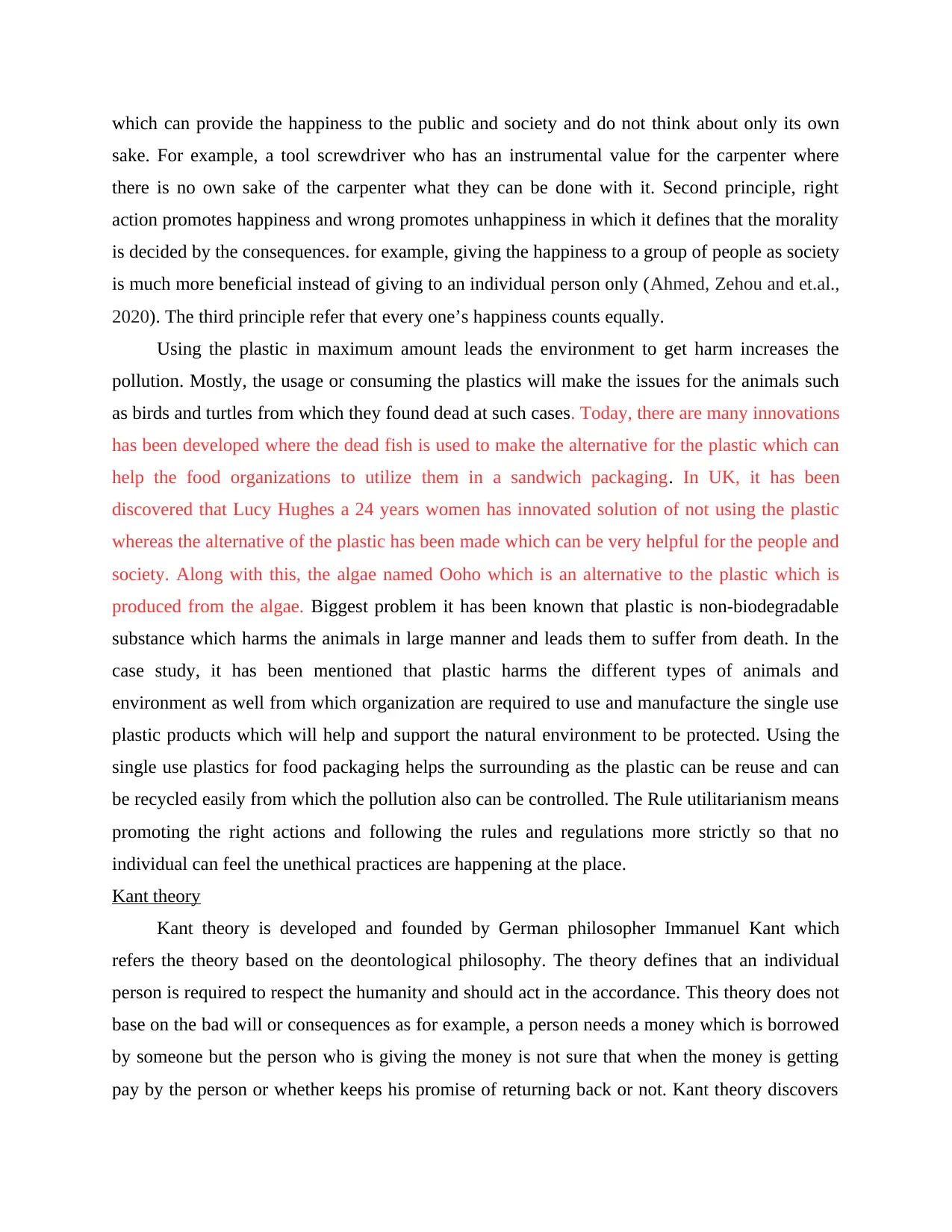
which can provide the happiness to the public and society and do not think about only its own
sake. For example, a tool screwdriver who has an instrumental value for the carpenter where
there is no own sake of the carpenter what they can be done with it. Second principle, right
action promotes happiness and wrong promotes unhappiness in which it defines that the morality
is decided by the consequences. for example, giving the happiness to a group of people as society
is much more beneficial instead of giving to an individual person only (Ahmed, Zehou and et.al.,
2020). The third principle refer that every one’s happiness counts equally.
Using the plastic in maximum amount leads the environment to get harm increases the
pollution. Mostly, the usage or consuming the plastics will make the issues for the animals such
as birds and turtles from which they found dead at such cases. Today, there are many innovations
has been developed where the dead fish is used to make the alternative for the plastic which can
help the food organizations to utilize them in a sandwich packaging. In UK, it has been
discovered that Lucy Hughes a 24 years women has innovated solution of not using the plastic
whereas the alternative of the plastic has been made which can be very helpful for the people and
society. Along with this, the algae named Ooho which is an alternative to the plastic which is
produced from the algae. Biggest problem it has been known that plastic is non-biodegradable
substance which harms the animals in large manner and leads them to suffer from death. In the
case study, it has been mentioned that plastic harms the different types of animals and
environment as well from which organization are required to use and manufacture the single use
plastic products which will help and support the natural environment to be protected. Using the
single use plastics for food packaging helps the surrounding as the plastic can be reuse and can
be recycled easily from which the pollution also can be controlled. The Rule utilitarianism means
promoting the right actions and following the rules and regulations more strictly so that no
individual can feel the unethical practices are happening at the place.
Kant theory
Kant theory is developed and founded by German philosopher Immanuel Kant which
refers the theory based on the deontological philosophy. The theory defines that an individual
person is required to respect the humanity and should act in the accordance. This theory does not
base on the bad will or consequences as for example, a person needs a money which is borrowed
by someone but the person who is giving the money is not sure that when the money is getting
pay by the person or whether keeps his promise of returning back or not. Kant theory discovers
sake. For example, a tool screwdriver who has an instrumental value for the carpenter where
there is no own sake of the carpenter what they can be done with it. Second principle, right
action promotes happiness and wrong promotes unhappiness in which it defines that the morality
is decided by the consequences. for example, giving the happiness to a group of people as society
is much more beneficial instead of giving to an individual person only (Ahmed, Zehou and et.al.,
2020). The third principle refer that every one’s happiness counts equally.
Using the plastic in maximum amount leads the environment to get harm increases the
pollution. Mostly, the usage or consuming the plastics will make the issues for the animals such
as birds and turtles from which they found dead at such cases. Today, there are many innovations
has been developed where the dead fish is used to make the alternative for the plastic which can
help the food organizations to utilize them in a sandwich packaging. In UK, it has been
discovered that Lucy Hughes a 24 years women has innovated solution of not using the plastic
whereas the alternative of the plastic has been made which can be very helpful for the people and
society. Along with this, the algae named Ooho which is an alternative to the plastic which is
produced from the algae. Biggest problem it has been known that plastic is non-biodegradable
substance which harms the animals in large manner and leads them to suffer from death. In the
case study, it has been mentioned that plastic harms the different types of animals and
environment as well from which organization are required to use and manufacture the single use
plastic products which will help and support the natural environment to be protected. Using the
single use plastics for food packaging helps the surrounding as the plastic can be reuse and can
be recycled easily from which the pollution also can be controlled. The Rule utilitarianism means
promoting the right actions and following the rules and regulations more strictly so that no
individual can feel the unethical practices are happening at the place.
Kant theory
Kant theory is developed and founded by German philosopher Immanuel Kant which
refers the theory based on the deontological philosophy. The theory defines that an individual
person is required to respect the humanity and should act in the accordance. This theory does not
base on the bad will or consequences as for example, a person needs a money which is borrowed
by someone but the person who is giving the money is not sure that when the money is getting
pay by the person or whether keeps his promise of returning back or not. Kant theory discovers
Secure Best Marks with AI Grader
Need help grading? Try our AI Grader for instant feedback on your assignments.
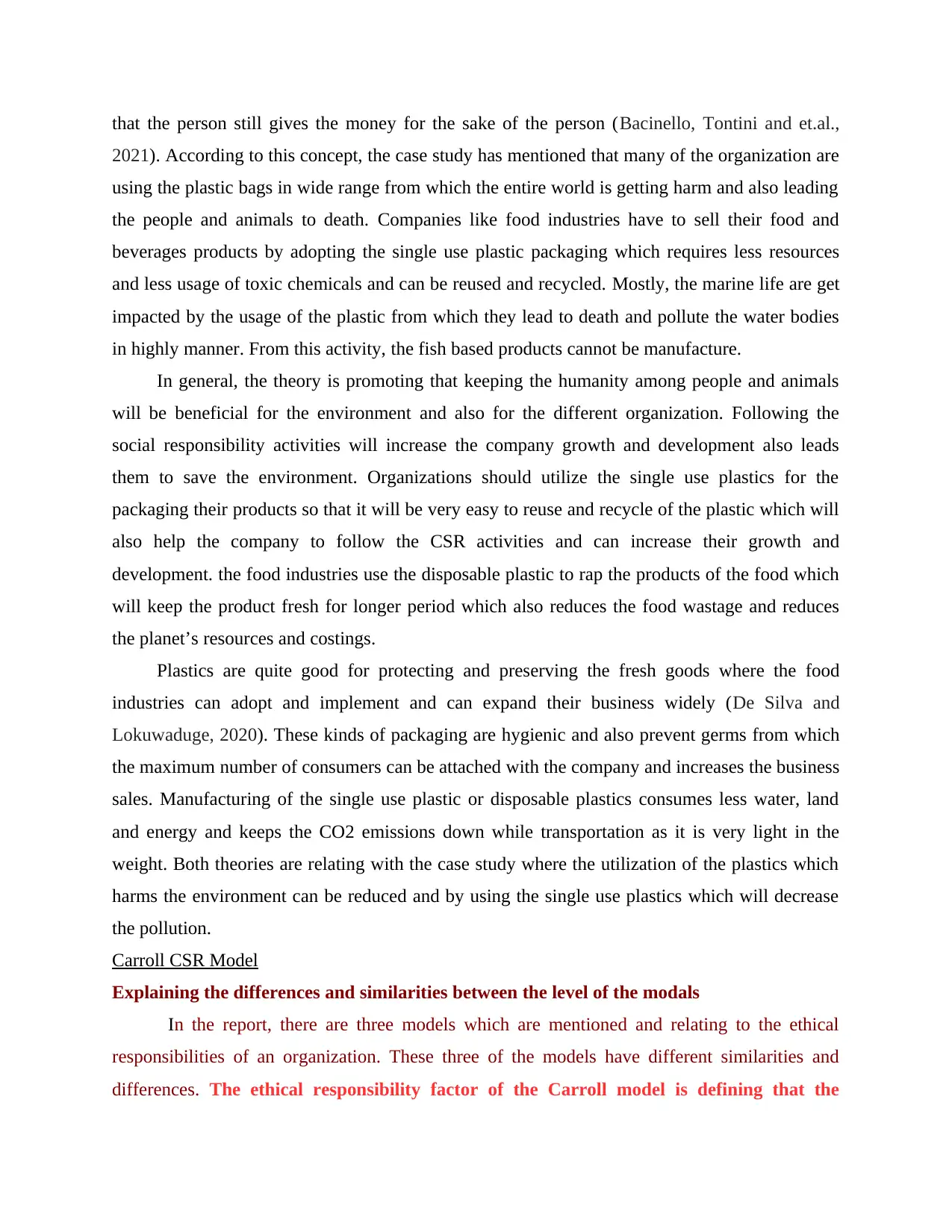
that the person still gives the money for the sake of the person (Bacinello, Tontini and et.al.,
2021). According to this concept, the case study has mentioned that many of the organization are
using the plastic bags in wide range from which the entire world is getting harm and also leading
the people and animals to death. Companies like food industries have to sell their food and
beverages products by adopting the single use plastic packaging which requires less resources
and less usage of toxic chemicals and can be reused and recycled. Mostly, the marine life are get
impacted by the usage of the plastic from which they lead to death and pollute the water bodies
in highly manner. From this activity, the fish based products cannot be manufacture.
In general, the theory is promoting that keeping the humanity among people and animals
will be beneficial for the environment and also for the different organization. Following the
social responsibility activities will increase the company growth and development also leads
them to save the environment. Organizations should utilize the single use plastics for the
packaging their products so that it will be very easy to reuse and recycle of the plastic which will
also help the company to follow the CSR activities and can increase their growth and
development. the food industries use the disposable plastic to rap the products of the food which
will keep the product fresh for longer period which also reduces the food wastage and reduces
the planet’s resources and costings.
Plastics are quite good for protecting and preserving the fresh goods where the food
industries can adopt and implement and can expand their business widely (De Silva and
Lokuwaduge, 2020). These kinds of packaging are hygienic and also prevent germs from which
the maximum number of consumers can be attached with the company and increases the business
sales. Manufacturing of the single use plastic or disposable plastics consumes less water, land
and energy and keeps the CO2 emissions down while transportation as it is very light in the
weight. Both theories are relating with the case study where the utilization of the plastics which
harms the environment can be reduced and by using the single use plastics which will decrease
the pollution.
Carroll CSR Model
Explaining the differences and similarities between the level of the modals
In the report, there are three models which are mentioned and relating to the ethical
responsibilities of an organization. These three of the models have different similarities and
differences. The ethical responsibility factor of the Carroll model is defining that the
2021). According to this concept, the case study has mentioned that many of the organization are
using the plastic bags in wide range from which the entire world is getting harm and also leading
the people and animals to death. Companies like food industries have to sell their food and
beverages products by adopting the single use plastic packaging which requires less resources
and less usage of toxic chemicals and can be reused and recycled. Mostly, the marine life are get
impacted by the usage of the plastic from which they lead to death and pollute the water bodies
in highly manner. From this activity, the fish based products cannot be manufacture.
In general, the theory is promoting that keeping the humanity among people and animals
will be beneficial for the environment and also for the different organization. Following the
social responsibility activities will increase the company growth and development also leads
them to save the environment. Organizations should utilize the single use plastics for the
packaging their products so that it will be very easy to reuse and recycle of the plastic which will
also help the company to follow the CSR activities and can increase their growth and
development. the food industries use the disposable plastic to rap the products of the food which
will keep the product fresh for longer period which also reduces the food wastage and reduces
the planet’s resources and costings.
Plastics are quite good for protecting and preserving the fresh goods where the food
industries can adopt and implement and can expand their business widely (De Silva and
Lokuwaduge, 2020). These kinds of packaging are hygienic and also prevent germs from which
the maximum number of consumers can be attached with the company and increases the business
sales. Manufacturing of the single use plastic or disposable plastics consumes less water, land
and energy and keeps the CO2 emissions down while transportation as it is very light in the
weight. Both theories are relating with the case study where the utilization of the plastics which
harms the environment can be reduced and by using the single use plastics which will decrease
the pollution.
Carroll CSR Model
Explaining the differences and similarities between the level of the modals
In the report, there are three models which are mentioned and relating to the ethical
responsibilities of an organization. These three of the models have different similarities and
differences. The ethical responsibility factor of the Carroll model is defining that the
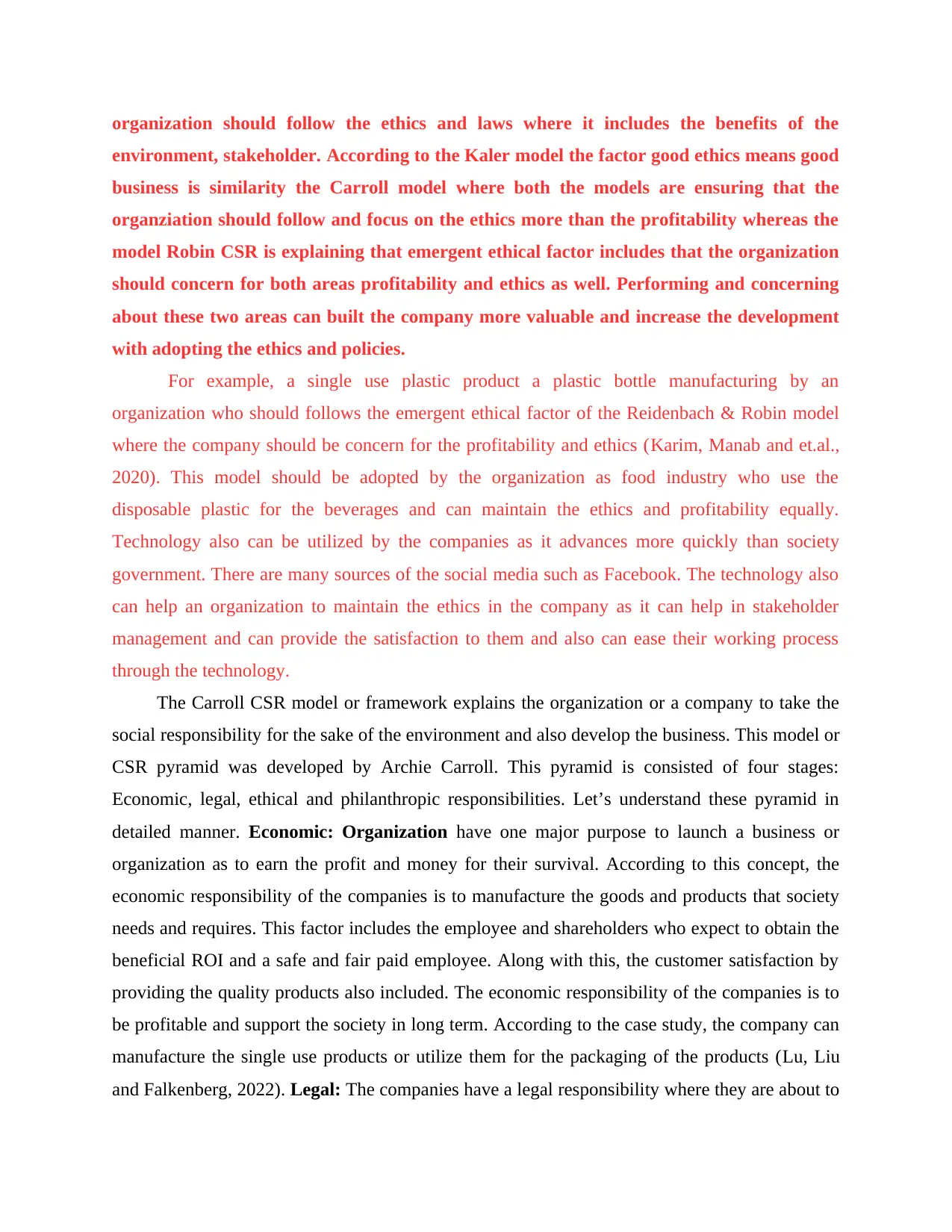
organization should follow the ethics and laws where it includes the benefits of the
environment, stakeholder. According to the Kaler model the factor good ethics means good
business is similarity the Carroll model where both the models are ensuring that the
organziation should follow and focus on the ethics more than the profitability whereas the
model Robin CSR is explaining that emergent ethical factor includes that the organization
should concern for both areas profitability and ethics as well. Performing and concerning
about these two areas can built the company more valuable and increase the development
with adopting the ethics and policies.
For example, a single use plastic product a plastic bottle manufacturing by an
organization who should follows the emergent ethical factor of the Reidenbach & Robin model
where the company should be concern for the profitability and ethics (Karim, Manab and et.al.,
2020). This model should be adopted by the organization as food industry who use the
disposable plastic for the beverages and can maintain the ethics and profitability equally.
Technology also can be utilized by the companies as it advances more quickly than society
government. There are many sources of the social media such as Facebook. The technology also
can help an organization to maintain the ethics in the company as it can help in stakeholder
management and can provide the satisfaction to them and also can ease their working process
through the technology.
The Carroll CSR model or framework explains the organization or a company to take the
social responsibility for the sake of the environment and also develop the business. This model or
CSR pyramid was developed by Archie Carroll. This pyramid is consisted of four stages:
Economic, legal, ethical and philanthropic responsibilities. Let’s understand these pyramid in
detailed manner. Economic: Organization have one major purpose to launch a business or
organization as to earn the profit and money for their survival. According to this concept, the
economic responsibility of the companies is to manufacture the goods and products that society
needs and requires. This factor includes the employee and shareholders who expect to obtain the
beneficial ROI and a safe and fair paid employee. Along with this, the customer satisfaction by
providing the quality products also included. The economic responsibility of the companies is to
be profitable and support the society in long term. According to the case study, the company can
manufacture the single use products or utilize them for the packaging of the products (Lu, Liu
and Falkenberg, 2022). Legal: The companies have a legal responsibility where they are about to
environment, stakeholder. According to the Kaler model the factor good ethics means good
business is similarity the Carroll model where both the models are ensuring that the
organziation should follow and focus on the ethics more than the profitability whereas the
model Robin CSR is explaining that emergent ethical factor includes that the organization
should concern for both areas profitability and ethics as well. Performing and concerning
about these two areas can built the company more valuable and increase the development
with adopting the ethics and policies.
For example, a single use plastic product a plastic bottle manufacturing by an
organization who should follows the emergent ethical factor of the Reidenbach & Robin model
where the company should be concern for the profitability and ethics (Karim, Manab and et.al.,
2020). This model should be adopted by the organization as food industry who use the
disposable plastic for the beverages and can maintain the ethics and profitability equally.
Technology also can be utilized by the companies as it advances more quickly than society
government. There are many sources of the social media such as Facebook. The technology also
can help an organization to maintain the ethics in the company as it can help in stakeholder
management and can provide the satisfaction to them and also can ease their working process
through the technology.
The Carroll CSR model or framework explains the organization or a company to take the
social responsibility for the sake of the environment and also develop the business. This model or
CSR pyramid was developed by Archie Carroll. This pyramid is consisted of four stages:
Economic, legal, ethical and philanthropic responsibilities. Let’s understand these pyramid in
detailed manner. Economic: Organization have one major purpose to launch a business or
organization as to earn the profit and money for their survival. According to this concept, the
economic responsibility of the companies is to manufacture the goods and products that society
needs and requires. This factor includes the employee and shareholders who expect to obtain the
beneficial ROI and a safe and fair paid employee. Along with this, the customer satisfaction by
providing the quality products also included. The economic responsibility of the companies is to
be profitable and support the society in long term. According to the case study, the company can
manufacture the single use products or utilize them for the packaging of the products (Lu, Liu
and Falkenberg, 2022). Legal: The companies have a legal responsibility where they are about to
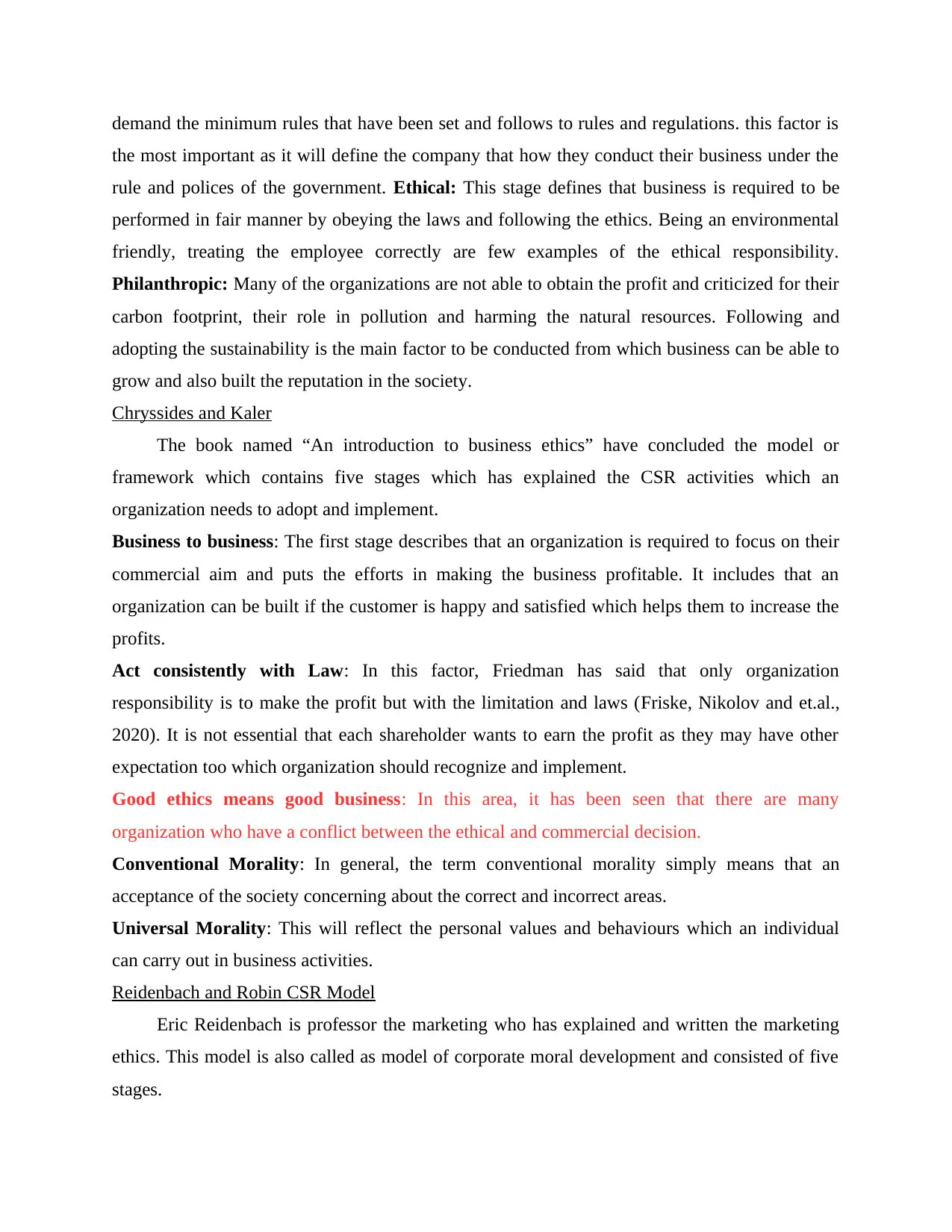
demand the minimum rules that have been set and follows to rules and regulations. this factor is
the most important as it will define the company that how they conduct their business under the
rule and polices of the government. Ethical: This stage defines that business is required to be
performed in fair manner by obeying the laws and following the ethics. Being an environmental
friendly, treating the employee correctly are few examples of the ethical responsibility.
Philanthropic: Many of the organizations are not able to obtain the profit and criticized for their
carbon footprint, their role in pollution and harming the natural resources. Following and
adopting the sustainability is the main factor to be conducted from which business can be able to
grow and also built the reputation in the society.
Chryssides and Kaler
The book named “An introduction to business ethics” have concluded the model or
framework which contains five stages which has explained the CSR activities which an
organization needs to adopt and implement.
Business to business: The first stage describes that an organization is required to focus on their
commercial aim and puts the efforts in making the business profitable. It includes that an
organization can be built if the customer is happy and satisfied which helps them to increase the
profits.
Act consistently with Law: In this factor, Friedman has said that only organization
responsibility is to make the profit but with the limitation and laws (Friske, Nikolov and et.al.,
2020). It is not essential that each shareholder wants to earn the profit as they may have other
expectation too which organization should recognize and implement.
Good ethics means good business: In this area, it has been seen that there are many
organization who have a conflict between the ethical and commercial decision.
Conventional Morality: In general, the term conventional morality simply means that an
acceptance of the society concerning about the correct and incorrect areas.
Universal Morality: This will reflect the personal values and behaviours which an individual
can carry out in business activities.
Reidenbach and Robin CSR Model
Eric Reidenbach is professor the marketing who has explained and written the marketing
ethics. This model is also called as model of corporate moral development and consisted of five
stages.
the most important as it will define the company that how they conduct their business under the
rule and polices of the government. Ethical: This stage defines that business is required to be
performed in fair manner by obeying the laws and following the ethics. Being an environmental
friendly, treating the employee correctly are few examples of the ethical responsibility.
Philanthropic: Many of the organizations are not able to obtain the profit and criticized for their
carbon footprint, their role in pollution and harming the natural resources. Following and
adopting the sustainability is the main factor to be conducted from which business can be able to
grow and also built the reputation in the society.
Chryssides and Kaler
The book named “An introduction to business ethics” have concluded the model or
framework which contains five stages which has explained the CSR activities which an
organization needs to adopt and implement.
Business to business: The first stage describes that an organization is required to focus on their
commercial aim and puts the efforts in making the business profitable. It includes that an
organization can be built if the customer is happy and satisfied which helps them to increase the
profits.
Act consistently with Law: In this factor, Friedman has said that only organization
responsibility is to make the profit but with the limitation and laws (Friske, Nikolov and et.al.,
2020). It is not essential that each shareholder wants to earn the profit as they may have other
expectation too which organization should recognize and implement.
Good ethics means good business: In this area, it has been seen that there are many
organization who have a conflict between the ethical and commercial decision.
Conventional Morality: In general, the term conventional morality simply means that an
acceptance of the society concerning about the correct and incorrect areas.
Universal Morality: This will reflect the personal values and behaviours which an individual
can carry out in business activities.
Reidenbach and Robin CSR Model
Eric Reidenbach is professor the marketing who has explained and written the marketing
ethics. This model is also called as model of corporate moral development and consisted of five
stages.
Paraphrase This Document
Need a fresh take? Get an instant paraphrase of this document with our AI Paraphraser
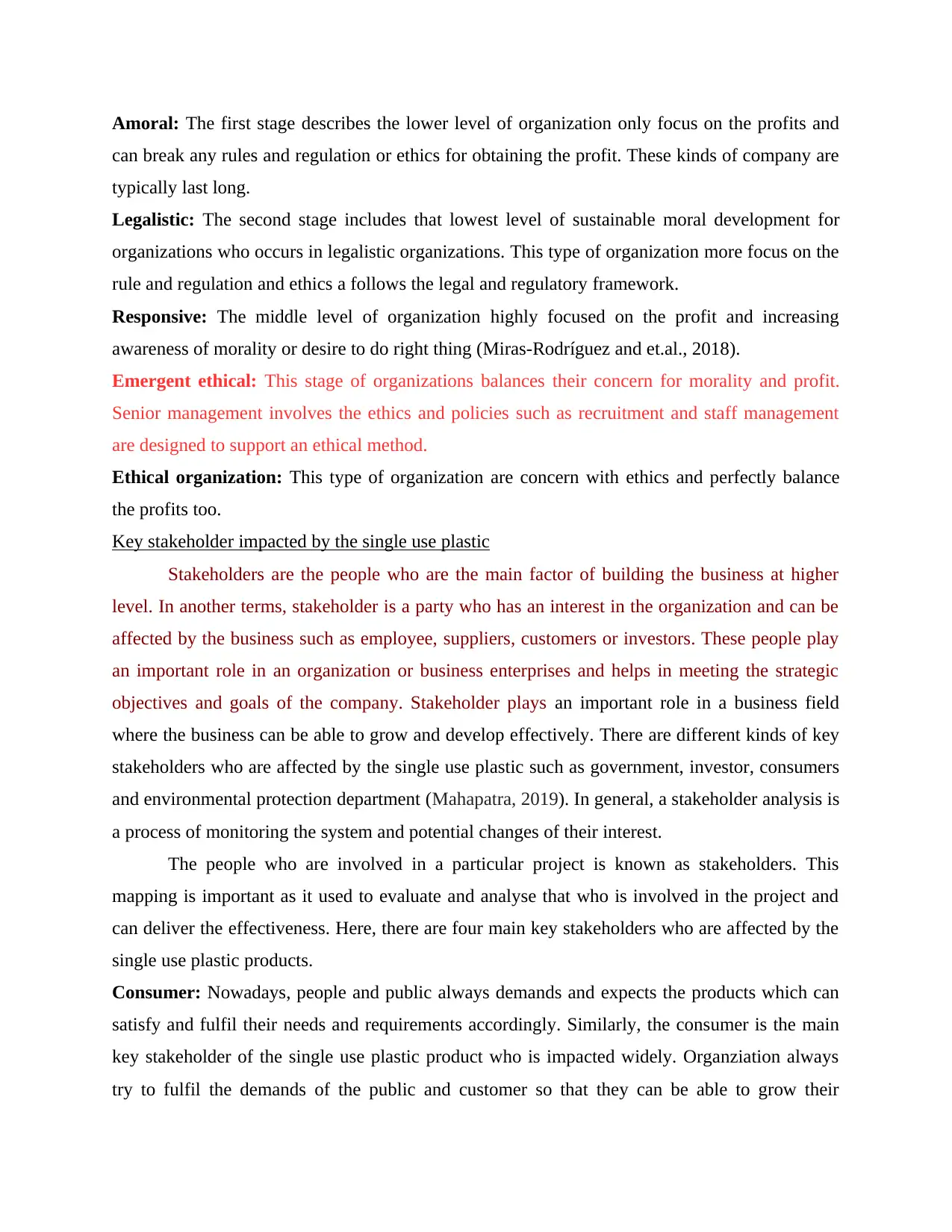
Amoral: The first stage describes the lower level of organization only focus on the profits and
can break any rules and regulation or ethics for obtaining the profit. These kinds of company are
typically last long.
Legalistic: The second stage includes that lowest level of sustainable moral development for
organizations who occurs in legalistic organizations. This type of organization more focus on the
rule and regulation and ethics a follows the legal and regulatory framework.
Responsive: The middle level of organization highly focused on the profit and increasing
awareness of morality or desire to do right thing (Miras-Rodríguez and et.al., 2018).
Emergent ethical: This stage of organizations balances their concern for morality and profit.
Senior management involves the ethics and policies such as recruitment and staff management
are designed to support an ethical method.
Ethical organization: This type of organization are concern with ethics and perfectly balance
the profits too.
Key stakeholder impacted by the single use plastic
Stakeholders are the people who are the main factor of building the business at higher
level. In another terms, stakeholder is a party who has an interest in the organization and can be
affected by the business such as employee, suppliers, customers or investors. These people play
an important role in an organization or business enterprises and helps in meeting the strategic
objectives and goals of the company. Stakeholder plays an important role in a business field
where the business can be able to grow and develop effectively. There are different kinds of key
stakeholders who are affected by the single use plastic such as government, investor, consumers
and environmental protection department (Mahapatra, 2019). In general, a stakeholder analysis is
a process of monitoring the system and potential changes of their interest.
The people who are involved in a particular project is known as stakeholders. This
mapping is important as it used to evaluate and analyse that who is involved in the project and
can deliver the effectiveness. Here, there are four main key stakeholders who are affected by the
single use plastic products.
Consumer: Nowadays, people and public always demands and expects the products which can
satisfy and fulfil their needs and requirements accordingly. Similarly, the consumer is the main
key stakeholder of the single use plastic product who is impacted widely. Organziation always
try to fulfil the demands of the public and customer so that they can be able to grow their
can break any rules and regulation or ethics for obtaining the profit. These kinds of company are
typically last long.
Legalistic: The second stage includes that lowest level of sustainable moral development for
organizations who occurs in legalistic organizations. This type of organization more focus on the
rule and regulation and ethics a follows the legal and regulatory framework.
Responsive: The middle level of organization highly focused on the profit and increasing
awareness of morality or desire to do right thing (Miras-Rodríguez and et.al., 2018).
Emergent ethical: This stage of organizations balances their concern for morality and profit.
Senior management involves the ethics and policies such as recruitment and staff management
are designed to support an ethical method.
Ethical organization: This type of organization are concern with ethics and perfectly balance
the profits too.
Key stakeholder impacted by the single use plastic
Stakeholders are the people who are the main factor of building the business at higher
level. In another terms, stakeholder is a party who has an interest in the organization and can be
affected by the business such as employee, suppliers, customers or investors. These people play
an important role in an organization or business enterprises and helps in meeting the strategic
objectives and goals of the company. Stakeholder plays an important role in a business field
where the business can be able to grow and develop effectively. There are different kinds of key
stakeholders who are affected by the single use plastic such as government, investor, consumers
and environmental protection department (Mahapatra, 2019). In general, a stakeholder analysis is
a process of monitoring the system and potential changes of their interest.
The people who are involved in a particular project is known as stakeholders. This
mapping is important as it used to evaluate and analyse that who is involved in the project and
can deliver the effectiveness. Here, there are four main key stakeholders who are affected by the
single use plastic products.
Consumer: Nowadays, people and public always demands and expects the products which can
satisfy and fulfil their needs and requirements accordingly. Similarly, the consumer is the main
key stakeholder of the single use plastic product who is impacted widely. Organziation always
try to fulfil the demands of the public and customer so that they can be able to grow their
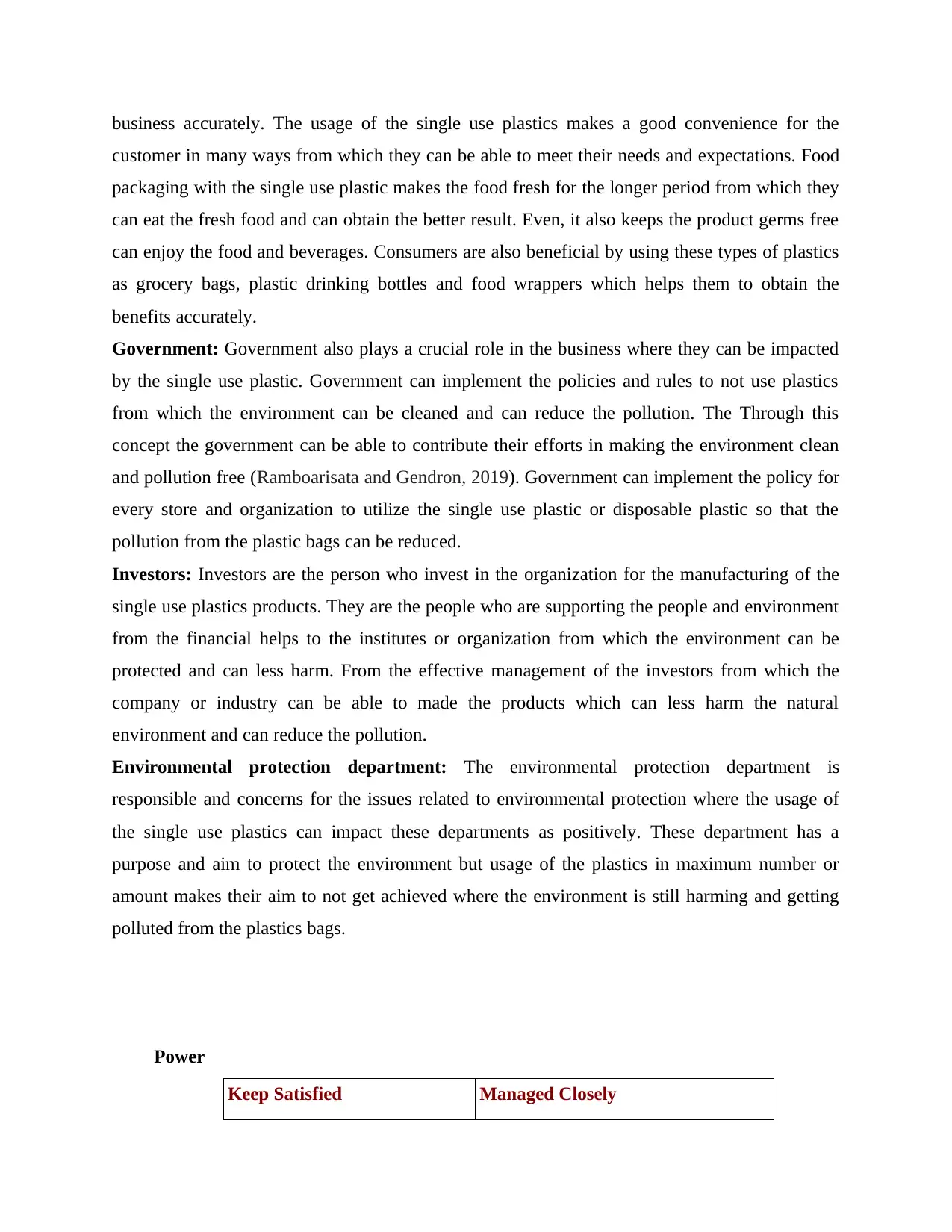
business accurately. The usage of the single use plastics makes a good convenience for the
customer in many ways from which they can be able to meet their needs and expectations. Food
packaging with the single use plastic makes the food fresh for the longer period from which they
can eat the fresh food and can obtain the better result. Even, it also keeps the product germs free
can enjoy the food and beverages. Consumers are also beneficial by using these types of plastics
as grocery bags, plastic drinking bottles and food wrappers which helps them to obtain the
benefits accurately.
Government: Government also plays a crucial role in the business where they can be impacted
by the single use plastic. Government can implement the policies and rules to not use plastics
from which the environment can be cleaned and can reduce the pollution. The Through this
concept the government can be able to contribute their efforts in making the environment clean
and pollution free (Ramboarisata and Gendron, 2019). Government can implement the policy for
every store and organization to utilize the single use plastic or disposable plastic so that the
pollution from the plastic bags can be reduced.
Investors: Investors are the person who invest in the organization for the manufacturing of the
single use plastics products. They are the people who are supporting the people and environment
from the financial helps to the institutes or organization from which the environment can be
protected and can less harm. From the effective management of the investors from which the
company or industry can be able to made the products which can less harm the natural
environment and can reduce the pollution.
Environmental protection department: The environmental protection department is
responsible and concerns for the issues related to environmental protection where the usage of
the single use plastics can impact these departments as positively. These department has a
purpose and aim to protect the environment but usage of the plastics in maximum number or
amount makes their aim to not get achieved where the environment is still harming and getting
polluted from the plastics bags.
Power
Keep Satisfied Managed Closely
customer in many ways from which they can be able to meet their needs and expectations. Food
packaging with the single use plastic makes the food fresh for the longer period from which they
can eat the fresh food and can obtain the better result. Even, it also keeps the product germs free
can enjoy the food and beverages. Consumers are also beneficial by using these types of plastics
as grocery bags, plastic drinking bottles and food wrappers which helps them to obtain the
benefits accurately.
Government: Government also plays a crucial role in the business where they can be impacted
by the single use plastic. Government can implement the policies and rules to not use plastics
from which the environment can be cleaned and can reduce the pollution. The Through this
concept the government can be able to contribute their efforts in making the environment clean
and pollution free (Ramboarisata and Gendron, 2019). Government can implement the policy for
every store and organization to utilize the single use plastic or disposable plastic so that the
pollution from the plastic bags can be reduced.
Investors: Investors are the person who invest in the organization for the manufacturing of the
single use plastics products. They are the people who are supporting the people and environment
from the financial helps to the institutes or organization from which the environment can be
protected and can less harm. From the effective management of the investors from which the
company or industry can be able to made the products which can less harm the natural
environment and can reduce the pollution.
Environmental protection department: The environmental protection department is
responsible and concerns for the issues related to environmental protection where the usage of
the single use plastics can impact these departments as positively. These department has a
purpose and aim to protect the environment but usage of the plastics in maximum number or
amount makes their aim to not get achieved where the environment is still harming and getting
polluted from the plastics bags.
Power
Keep Satisfied Managed Closely
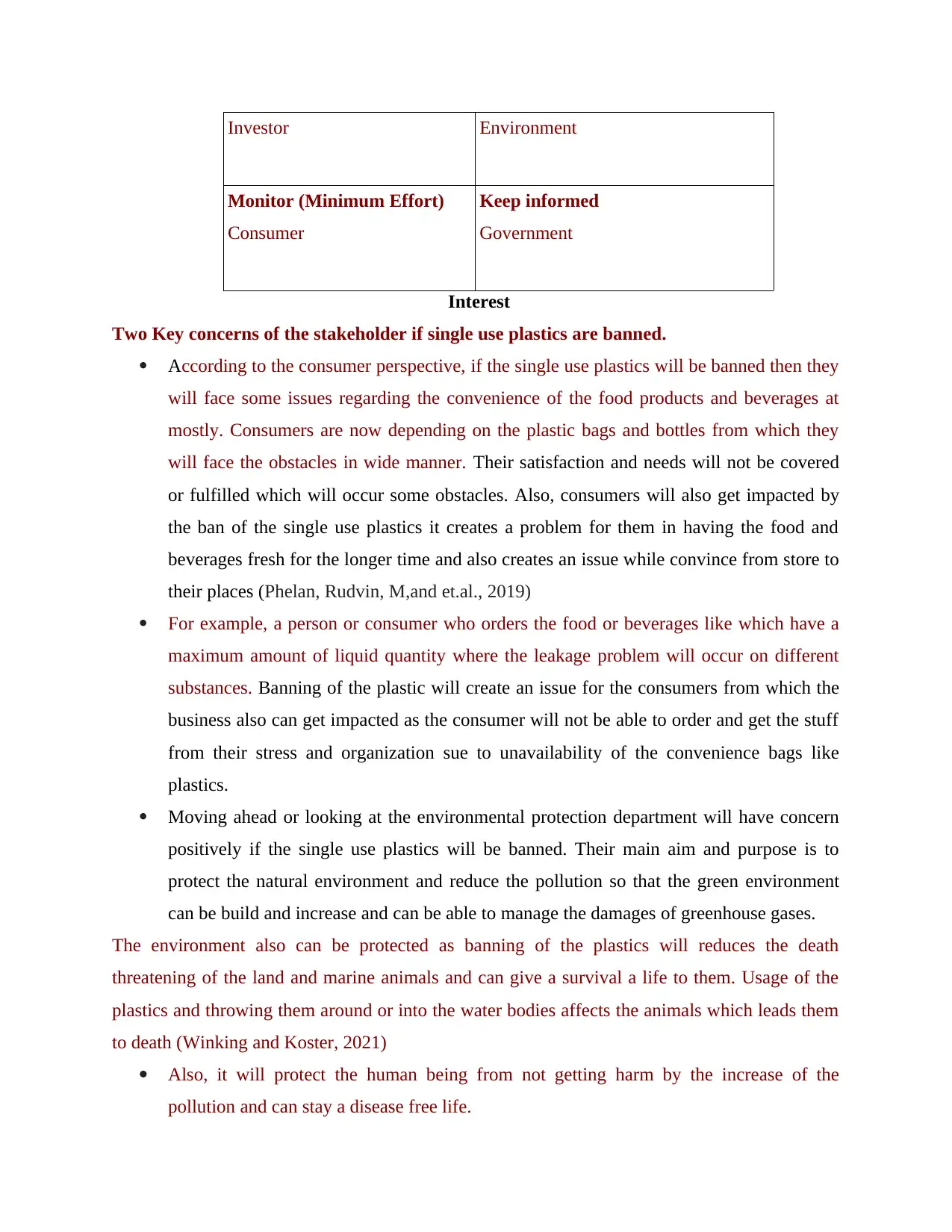
Investor Environment
Monitor (Minimum Effort)
Consumer
Keep informed
Government
Interest
Two Key concerns of the stakeholder if single use plastics are banned.
According to the consumer perspective, if the single use plastics will be banned then they
will face some issues regarding the convenience of the food products and beverages at
mostly. Consumers are now depending on the plastic bags and bottles from which they
will face the obstacles in wide manner. Their satisfaction and needs will not be covered
or fulfilled which will occur some obstacles. Also, consumers will also get impacted by
the ban of the single use plastics it creates a problem for them in having the food and
beverages fresh for the longer time and also creates an issue while convince from store to
their places (Phelan, Rudvin, M,and et.al., 2019)
For example, a person or consumer who orders the food or beverages like which have a
maximum amount of liquid quantity where the leakage problem will occur on different
substances. Banning of the plastic will create an issue for the consumers from which the
business also can get impacted as the consumer will not be able to order and get the stuff
from their stress and organization sue to unavailability of the convenience bags like
plastics.
Moving ahead or looking at the environmental protection department will have concern
positively if the single use plastics will be banned. Their main aim and purpose is to
protect the natural environment and reduce the pollution so that the green environment
can be build and increase and can be able to manage the damages of greenhouse gases.
The environment also can be protected as banning of the plastics will reduces the death
threatening of the land and marine animals and can give a survival a life to them. Usage of the
plastics and throwing them around or into the water bodies affects the animals which leads them
to death (Winking and Koster, 2021)
Also, it will protect the human being from not getting harm by the increase of the
pollution and can stay a disease free life.
Monitor (Minimum Effort)
Consumer
Keep informed
Government
Interest
Two Key concerns of the stakeholder if single use plastics are banned.
According to the consumer perspective, if the single use plastics will be banned then they
will face some issues regarding the convenience of the food products and beverages at
mostly. Consumers are now depending on the plastic bags and bottles from which they
will face the obstacles in wide manner. Their satisfaction and needs will not be covered
or fulfilled which will occur some obstacles. Also, consumers will also get impacted by
the ban of the single use plastics it creates a problem for them in having the food and
beverages fresh for the longer time and also creates an issue while convince from store to
their places (Phelan, Rudvin, M,and et.al., 2019)
For example, a person or consumer who orders the food or beverages like which have a
maximum amount of liquid quantity where the leakage problem will occur on different
substances. Banning of the plastic will create an issue for the consumers from which the
business also can get impacted as the consumer will not be able to order and get the stuff
from their stress and organization sue to unavailability of the convenience bags like
plastics.
Moving ahead or looking at the environmental protection department will have concern
positively if the single use plastics will be banned. Their main aim and purpose is to
protect the natural environment and reduce the pollution so that the green environment
can be build and increase and can be able to manage the damages of greenhouse gases.
The environment also can be protected as banning of the plastics will reduces the death
threatening of the land and marine animals and can give a survival a life to them. Usage of the
plastics and throwing them around or into the water bodies affects the animals which leads them
to death (Winking and Koster, 2021)
Also, it will protect the human being from not getting harm by the increase of the
pollution and can stay a disease free life.
Secure Best Marks with AI Grader
Need help grading? Try our AI Grader for instant feedback on your assignments.
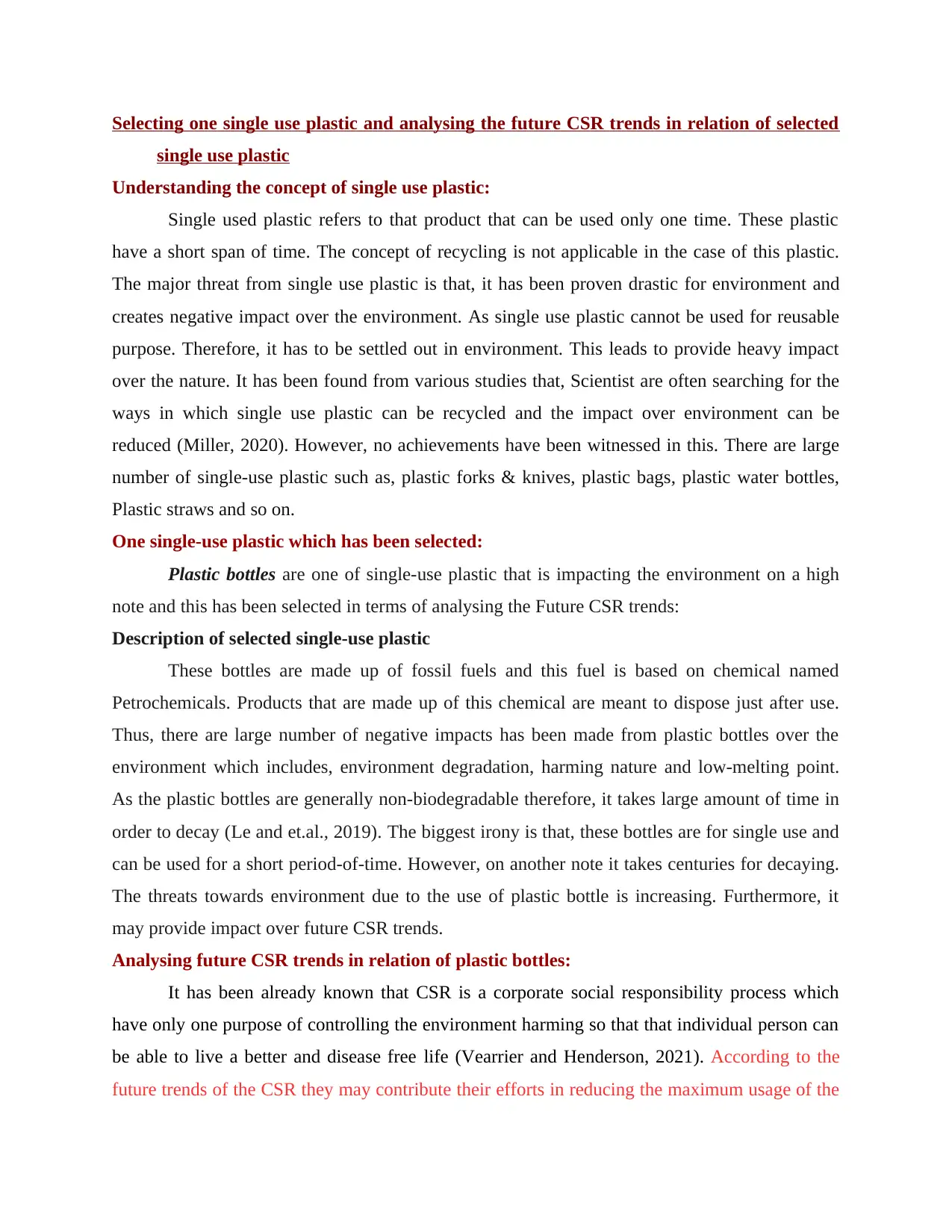
Selecting one single use plastic and analysing the future CSR trends in relation of selected
single use plastic
Understanding the concept of single use plastic:
Single used plastic refers to that product that can be used only one time. These plastic
have a short span of time. The concept of recycling is not applicable in the case of this plastic.
The major threat from single use plastic is that, it has been proven drastic for environment and
creates negative impact over the environment. As single use plastic cannot be used for reusable
purpose. Therefore, it has to be settled out in environment. This leads to provide heavy impact
over the nature. It has been found from various studies that, Scientist are often searching for the
ways in which single use plastic can be recycled and the impact over environment can be
reduced (Miller, 2020). However, no achievements have been witnessed in this. There are large
number of single-use plastic such as, plastic forks & knives, plastic bags, plastic water bottles,
Plastic straws and so on.
One single-use plastic which has been selected:
Plastic bottles are one of single-use plastic that is impacting the environment on a high
note and this has been selected in terms of analysing the Future CSR trends:
Description of selected single-use plastic
These bottles are made up of fossil fuels and this fuel is based on chemical named
Petrochemicals. Products that are made up of this chemical are meant to dispose just after use.
Thus, there are large number of negative impacts has been made from plastic bottles over the
environment which includes, environment degradation, harming nature and low-melting point.
As the plastic bottles are generally non-biodegradable therefore, it takes large amount of time in
order to decay (Le and et.al., 2019). The biggest irony is that, these bottles are for single use and
can be used for a short period-of-time. However, on another note it takes centuries for decaying.
The threats towards environment due to the use of plastic bottle is increasing. Furthermore, it
may provide impact over future CSR trends.
Analysing future CSR trends in relation of plastic bottles:
It has been already known that CSR is a corporate social responsibility process which
have only one purpose of controlling the environment harming so that that individual person can
be able to live a better and disease free life (Vearrier and Henderson, 2021). According to the
future trends of the CSR they may contribute their efforts in reducing the maximum usage of the
single use plastic
Understanding the concept of single use plastic:
Single used plastic refers to that product that can be used only one time. These plastic
have a short span of time. The concept of recycling is not applicable in the case of this plastic.
The major threat from single use plastic is that, it has been proven drastic for environment and
creates negative impact over the environment. As single use plastic cannot be used for reusable
purpose. Therefore, it has to be settled out in environment. This leads to provide heavy impact
over the nature. It has been found from various studies that, Scientist are often searching for the
ways in which single use plastic can be recycled and the impact over environment can be
reduced (Miller, 2020). However, no achievements have been witnessed in this. There are large
number of single-use plastic such as, plastic forks & knives, plastic bags, plastic water bottles,
Plastic straws and so on.
One single-use plastic which has been selected:
Plastic bottles are one of single-use plastic that is impacting the environment on a high
note and this has been selected in terms of analysing the Future CSR trends:
Description of selected single-use plastic
These bottles are made up of fossil fuels and this fuel is based on chemical named
Petrochemicals. Products that are made up of this chemical are meant to dispose just after use.
Thus, there are large number of negative impacts has been made from plastic bottles over the
environment which includes, environment degradation, harming nature and low-melting point.
As the plastic bottles are generally non-biodegradable therefore, it takes large amount of time in
order to decay (Le and et.al., 2019). The biggest irony is that, these bottles are for single use and
can be used for a short period-of-time. However, on another note it takes centuries for decaying.
The threats towards environment due to the use of plastic bottle is increasing. Furthermore, it
may provide impact over future CSR trends.
Analysing future CSR trends in relation of plastic bottles:
It has been already known that CSR is a corporate social responsibility process which
have only one purpose of controlling the environment harming so that that individual person can
be able to live a better and disease free life (Vearrier and Henderson, 2021). According to the
future trends of the CSR they may contribute their efforts in reducing the maximum usage of the
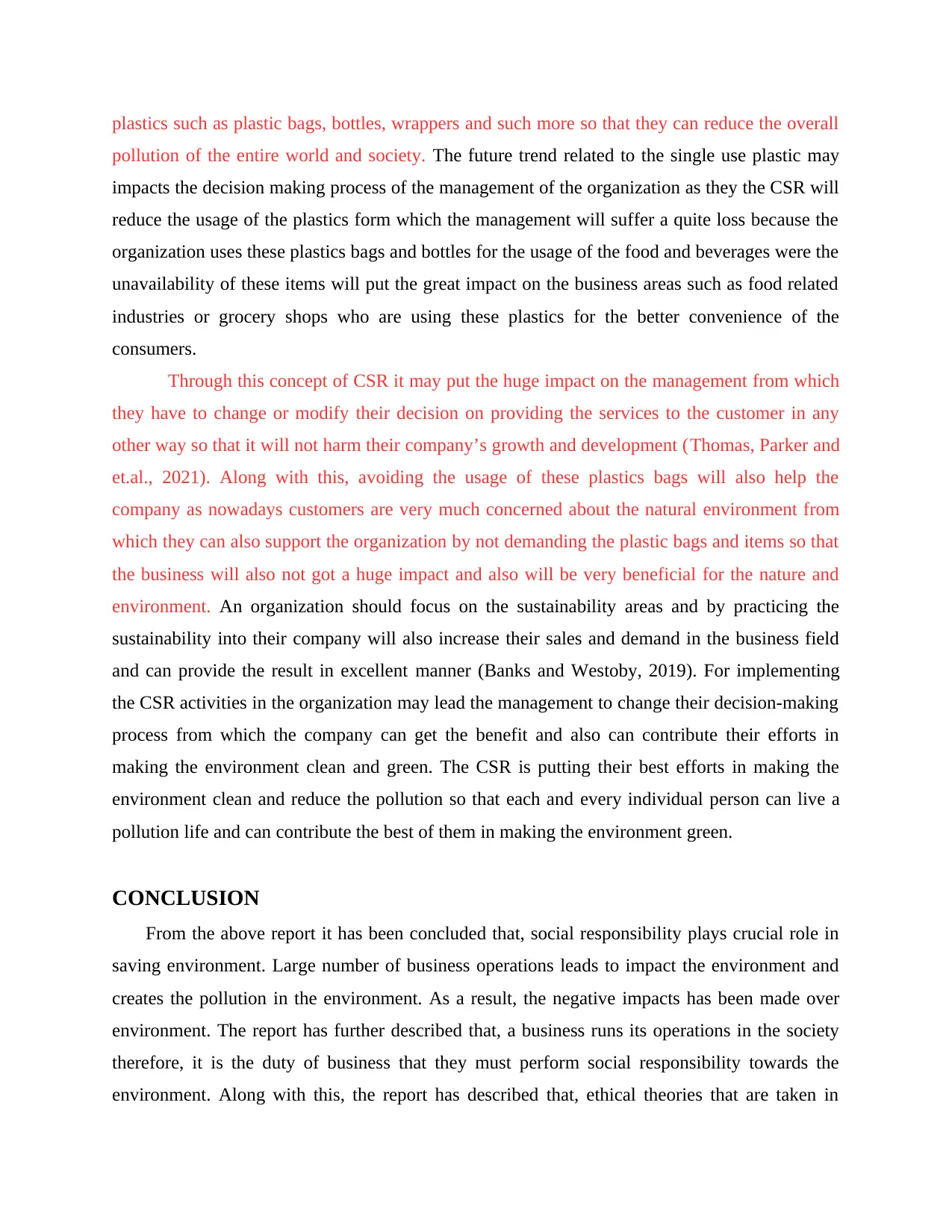
plastics such as plastic bags, bottles, wrappers and such more so that they can reduce the overall
pollution of the entire world and society. The future trend related to the single use plastic may
impacts the decision making process of the management of the organization as they the CSR will
reduce the usage of the plastics form which the management will suffer a quite loss because the
organization uses these plastics bags and bottles for the usage of the food and beverages were the
unavailability of these items will put the great impact on the business areas such as food related
industries or grocery shops who are using these plastics for the better convenience of the
consumers.
Through this concept of CSR it may put the huge impact on the management from which
they have to change or modify their decision on providing the services to the customer in any
other way so that it will not harm their company’s growth and development (Thomas, Parker and
et.al., 2021). Along with this, avoiding the usage of these plastics bags will also help the
company as nowadays customers are very much concerned about the natural environment from
which they can also support the organization by not demanding the plastic bags and items so that
the business will also not got a huge impact and also will be very beneficial for the nature and
environment. An organization should focus on the sustainability areas and by practicing the
sustainability into their company will also increase their sales and demand in the business field
and can provide the result in excellent manner (Banks and Westoby, 2019). For implementing
the CSR activities in the organization may lead the management to change their decision-making
process from which the company can get the benefit and also can contribute their efforts in
making the environment clean and green. The CSR is putting their best efforts in making the
environment clean and reduce the pollution so that each and every individual person can live a
pollution life and can contribute the best of them in making the environment green.
CONCLUSION
From the above report it has been concluded that, social responsibility plays crucial role in
saving environment. Large number of business operations leads to impact the environment and
creates the pollution in the environment. As a result, the negative impacts has been made over
environment. The report has further described that, a business runs its operations in the society
therefore, it is the duty of business that they must perform social responsibility towards the
environment. Along with this, the report has described that, ethical theories that are taken in
pollution of the entire world and society. The future trend related to the single use plastic may
impacts the decision making process of the management of the organization as they the CSR will
reduce the usage of the plastics form which the management will suffer a quite loss because the
organization uses these plastics bags and bottles for the usage of the food and beverages were the
unavailability of these items will put the great impact on the business areas such as food related
industries or grocery shops who are using these plastics for the better convenience of the
consumers.
Through this concept of CSR it may put the huge impact on the management from which
they have to change or modify their decision on providing the services to the customer in any
other way so that it will not harm their company’s growth and development (Thomas, Parker and
et.al., 2021). Along with this, avoiding the usage of these plastics bags will also help the
company as nowadays customers are very much concerned about the natural environment from
which they can also support the organization by not demanding the plastic bags and items so that
the business will also not got a huge impact and also will be very beneficial for the nature and
environment. An organization should focus on the sustainability areas and by practicing the
sustainability into their company will also increase their sales and demand in the business field
and can provide the result in excellent manner (Banks and Westoby, 2019). For implementing
the CSR activities in the organization may lead the management to change their decision-making
process from which the company can get the benefit and also can contribute their efforts in
making the environment clean and green. The CSR is putting their best efforts in making the
environment clean and reduce the pollution so that each and every individual person can live a
pollution life and can contribute the best of them in making the environment green.
CONCLUSION
From the above report it has been concluded that, social responsibility plays crucial role in
saving environment. Large number of business operations leads to impact the environment and
creates the pollution in the environment. As a result, the negative impacts has been made over
environment. The report has further described that, a business runs its operations in the society
therefore, it is the duty of business that they must perform social responsibility towards the
environment. Along with this, the report has described that, ethical theories that are taken in
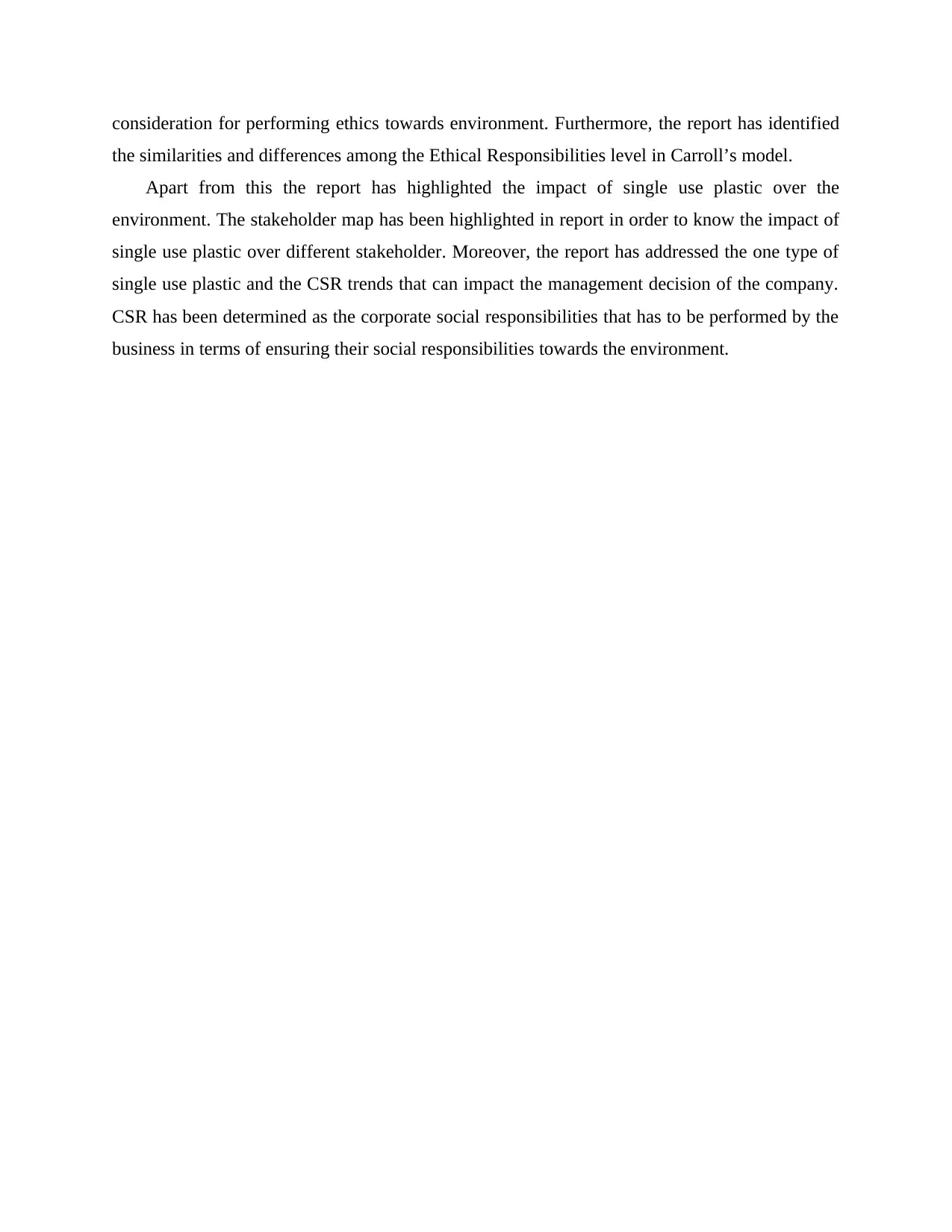
consideration for performing ethics towards environment. Furthermore, the report has identified
the similarities and differences among the Ethical Responsibilities level in Carroll’s model.
Apart from this the report has highlighted the impact of single use plastic over the
environment. The stakeholder map has been highlighted in report in order to know the impact of
single use plastic over different stakeholder. Moreover, the report has addressed the one type of
single use plastic and the CSR trends that can impact the management decision of the company.
CSR has been determined as the corporate social responsibilities that has to be performed by the
business in terms of ensuring their social responsibilities towards the environment.
the similarities and differences among the Ethical Responsibilities level in Carroll’s model.
Apart from this the report has highlighted the impact of single use plastic over the
environment. The stakeholder map has been highlighted in report in order to know the impact of
single use plastic over different stakeholder. Moreover, the report has addressed the one type of
single use plastic and the CSR trends that can impact the management decision of the company.
CSR has been determined as the corporate social responsibilities that has to be performed by the
business in terms of ensuring their social responsibilities towards the environment.
Paraphrase This Document
Need a fresh take? Get an instant paraphrase of this document with our AI Paraphraser
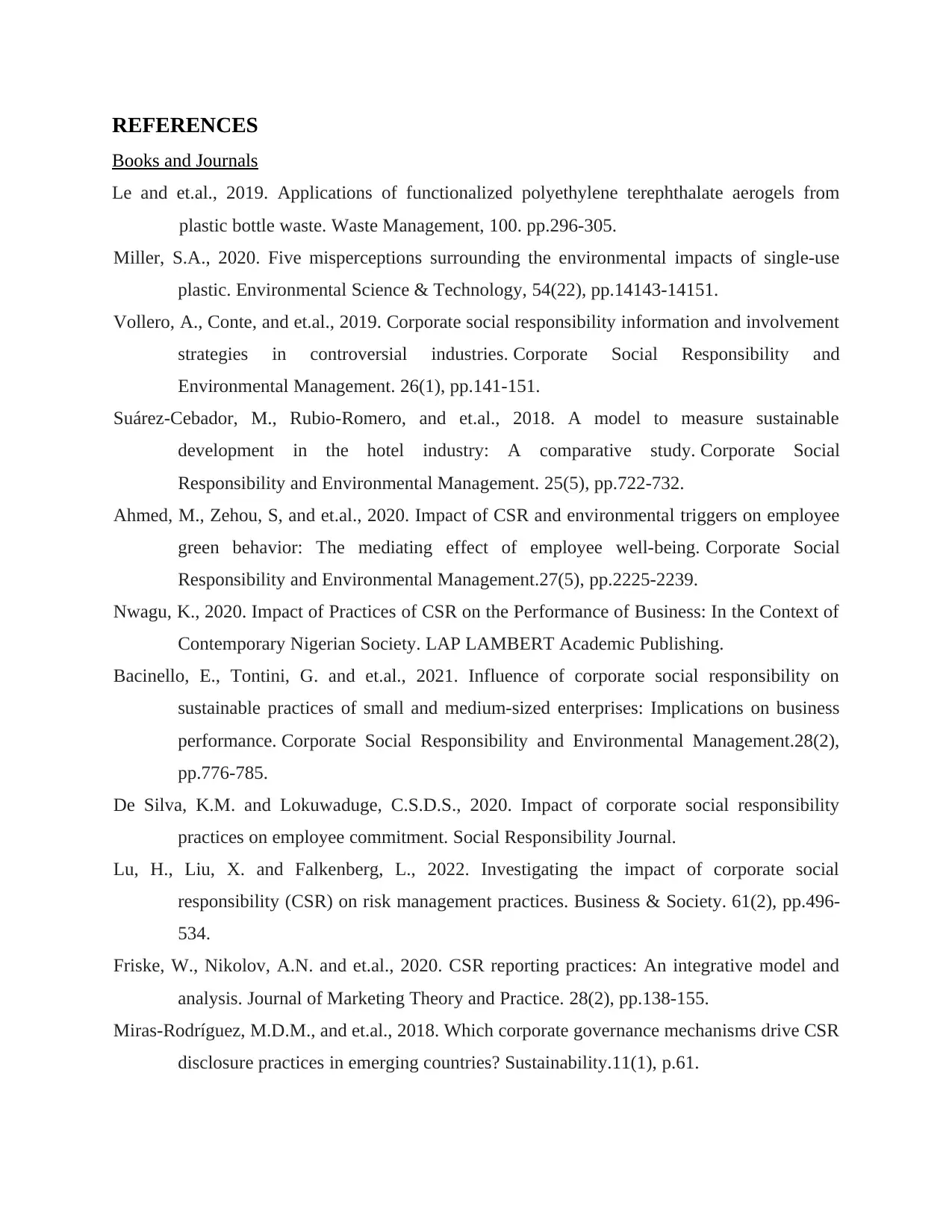
REFERENCES
Books and Journals
Le and et.al., 2019. Applications of functionalized polyethylene terephthalate aerogels from
plastic bottle waste. Waste Management, 100. pp.296-305.
Miller, S.A., 2020. Five misperceptions surrounding the environmental impacts of single-use
plastic. Environmental Science & Technology, 54(22), pp.14143-14151.
Vollero, A., Conte, and et.al., 2019. Corporate social responsibility information and involvement
strategies in controversial industries. Corporate Social Responsibility and
Environmental Management. 26(1), pp.141-151.
Suárez‐Cebador, M., Rubio‐Romero, and et.al., 2018. A model to measure sustainable
development in the hotel industry: A comparative study. Corporate Social
Responsibility and Environmental Management. 25(5), pp.722-732.
Ahmed, M., Zehou, S, and et.al., 2020. Impact of CSR and environmental triggers on employee
green behavior: The mediating effect of employee well‐being. Corporate Social
Responsibility and Environmental Management.27(5), pp.2225-2239.
Nwagu, K., 2020. Impact of Practices of CSR on the Performance of Business: In the Context of
Contemporary Nigerian Society. LAP LAMBERT Academic Publishing.
Bacinello, E., Tontini, G. and et.al., 2021. Influence of corporate social responsibility on
sustainable practices of small and medium‐sized enterprises: Implications on business
performance. Corporate Social Responsibility and Environmental Management.28(2),
pp.776-785.
De Silva, K.M. and Lokuwaduge, C.S.D.S., 2020. Impact of corporate social responsibility
practices on employee commitment. Social Responsibility Journal.
Lu, H., Liu, X. and Falkenberg, L., 2022. Investigating the impact of corporate social
responsibility (CSR) on risk management practices. Business & Society. 61(2), pp.496-
534.
Friske, W., Nikolov, A.N. and et.al., 2020. CSR reporting practices: An integrative model and
analysis. Journal of Marketing Theory and Practice. 28(2), pp.138-155.
Miras-Rodríguez, M.D.M., and et.al., 2018. Which corporate governance mechanisms drive CSR
disclosure practices in emerging countries? Sustainability.11(1), p.61.
Books and Journals
Le and et.al., 2019. Applications of functionalized polyethylene terephthalate aerogels from
plastic bottle waste. Waste Management, 100. pp.296-305.
Miller, S.A., 2020. Five misperceptions surrounding the environmental impacts of single-use
plastic. Environmental Science & Technology, 54(22), pp.14143-14151.
Vollero, A., Conte, and et.al., 2019. Corporate social responsibility information and involvement
strategies in controversial industries. Corporate Social Responsibility and
Environmental Management. 26(1), pp.141-151.
Suárez‐Cebador, M., Rubio‐Romero, and et.al., 2018. A model to measure sustainable
development in the hotel industry: A comparative study. Corporate Social
Responsibility and Environmental Management. 25(5), pp.722-732.
Ahmed, M., Zehou, S, and et.al., 2020. Impact of CSR and environmental triggers on employee
green behavior: The mediating effect of employee well‐being. Corporate Social
Responsibility and Environmental Management.27(5), pp.2225-2239.
Nwagu, K., 2020. Impact of Practices of CSR on the Performance of Business: In the Context of
Contemporary Nigerian Society. LAP LAMBERT Academic Publishing.
Bacinello, E., Tontini, G. and et.al., 2021. Influence of corporate social responsibility on
sustainable practices of small and medium‐sized enterprises: Implications on business
performance. Corporate Social Responsibility and Environmental Management.28(2),
pp.776-785.
De Silva, K.M. and Lokuwaduge, C.S.D.S., 2020. Impact of corporate social responsibility
practices on employee commitment. Social Responsibility Journal.
Lu, H., Liu, X. and Falkenberg, L., 2022. Investigating the impact of corporate social
responsibility (CSR) on risk management practices. Business & Society. 61(2), pp.496-
534.
Friske, W., Nikolov, A.N. and et.al., 2020. CSR reporting practices: An integrative model and
analysis. Journal of Marketing Theory and Practice. 28(2), pp.138-155.
Miras-Rodríguez, M.D.M., and et.al., 2018. Which corporate governance mechanisms drive CSR
disclosure practices in emerging countries? Sustainability.11(1), p.61.
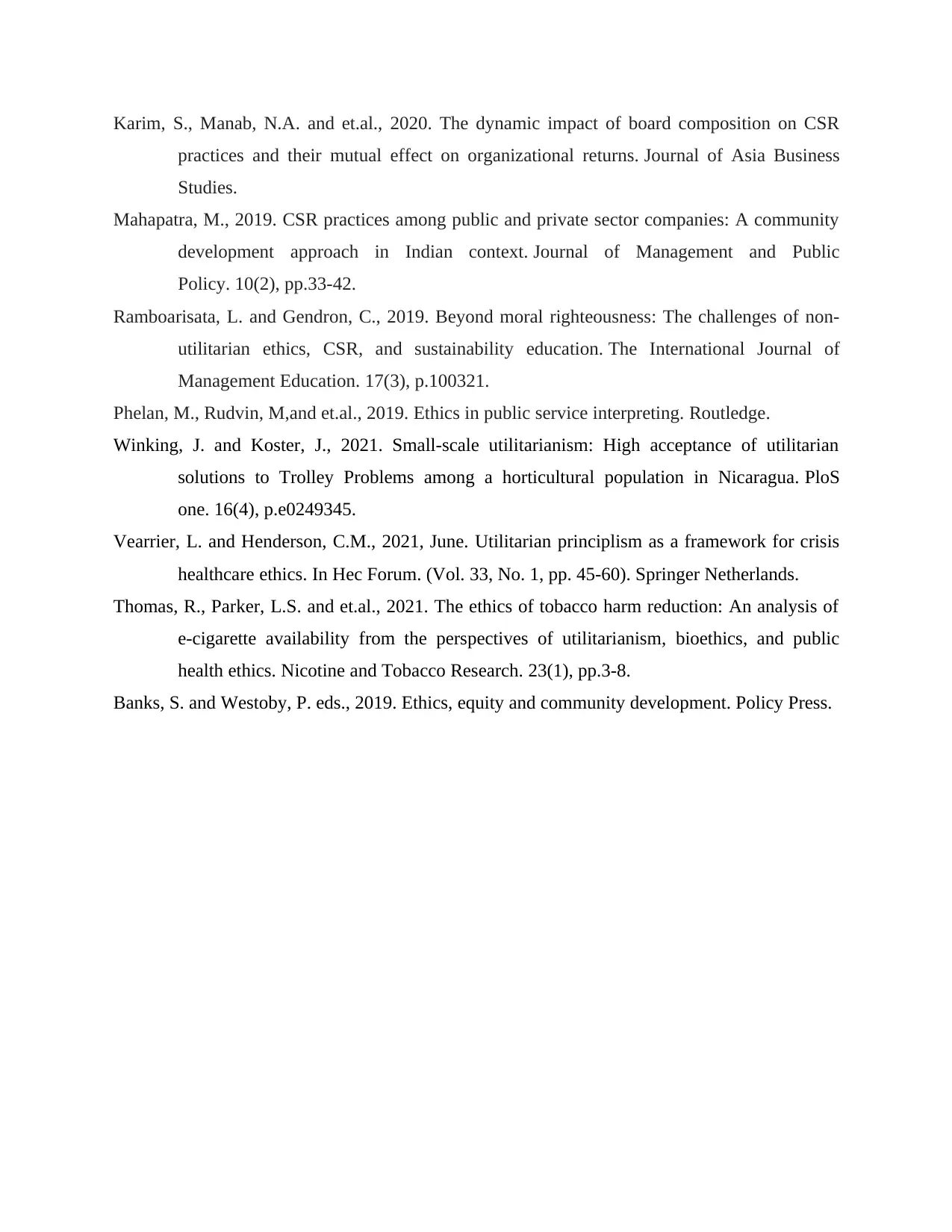
Karim, S., Manab, N.A. and et.al., 2020. The dynamic impact of board composition on CSR
practices and their mutual effect on organizational returns. Journal of Asia Business
Studies.
Mahapatra, M., 2019. CSR practices among public and private sector companies: A community
development approach in Indian context. Journal of Management and Public
Policy. 10(2), pp.33-42.
Ramboarisata, L. and Gendron, C., 2019. Beyond moral righteousness: The challenges of non-
utilitarian ethics, CSR, and sustainability education. The International Journal of
Management Education. 17(3), p.100321.
Phelan, M., Rudvin, M,and et.al., 2019. Ethics in public service interpreting. Routledge.
Winking, J. and Koster, J., 2021. Small-scale utilitarianism: High acceptance of utilitarian
solutions to Trolley Problems among a horticultural population in Nicaragua. PloS
one. 16(4), p.e0249345.
Vearrier, L. and Henderson, C.M., 2021, June. Utilitarian principlism as a framework for crisis
healthcare ethics. In Hec Forum. (Vol. 33, No. 1, pp. 45-60). Springer Netherlands.
Thomas, R., Parker, L.S. and et.al., 2021. The ethics of tobacco harm reduction: An analysis of
e-cigarette availability from the perspectives of utilitarianism, bioethics, and public
health ethics. Nicotine and Tobacco Research. 23(1), pp.3-8.
Banks, S. and Westoby, P. eds., 2019. Ethics, equity and community development. Policy Press.
practices and their mutual effect on organizational returns. Journal of Asia Business
Studies.
Mahapatra, M., 2019. CSR practices among public and private sector companies: A community
development approach in Indian context. Journal of Management and Public
Policy. 10(2), pp.33-42.
Ramboarisata, L. and Gendron, C., 2019. Beyond moral righteousness: The challenges of non-
utilitarian ethics, CSR, and sustainability education. The International Journal of
Management Education. 17(3), p.100321.
Phelan, M., Rudvin, M,and et.al., 2019. Ethics in public service interpreting. Routledge.
Winking, J. and Koster, J., 2021. Small-scale utilitarianism: High acceptance of utilitarian
solutions to Trolley Problems among a horticultural population in Nicaragua. PloS
one. 16(4), p.e0249345.
Vearrier, L. and Henderson, C.M., 2021, June. Utilitarian principlism as a framework for crisis
healthcare ethics. In Hec Forum. (Vol. 33, No. 1, pp. 45-60). Springer Netherlands.
Thomas, R., Parker, L.S. and et.al., 2021. The ethics of tobacco harm reduction: An analysis of
e-cigarette availability from the perspectives of utilitarianism, bioethics, and public
health ethics. Nicotine and Tobacco Research. 23(1), pp.3-8.
Banks, S. and Westoby, P. eds., 2019. Ethics, equity and community development. Policy Press.
1 out of 15
Related Documents
Your All-in-One AI-Powered Toolkit for Academic Success.
+13062052269
info@desklib.com
Available 24*7 on WhatsApp / Email
![[object Object]](/_next/static/media/star-bottom.7253800d.svg)
Unlock your academic potential
© 2024 | Zucol Services PVT LTD | All rights reserved.





